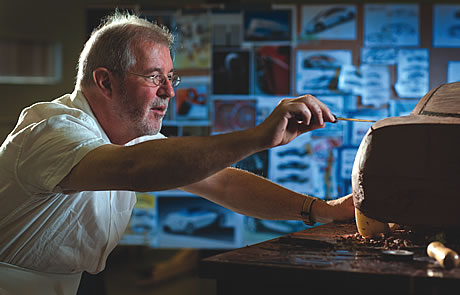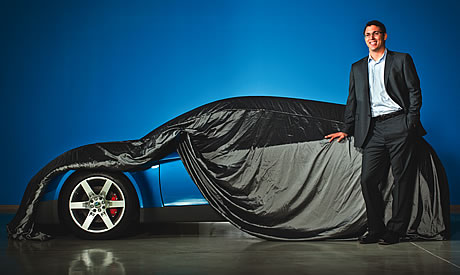 28-year-old founder R.J. Scaringe says Rivian Automotive's coupe is designed to appeal to buyers who want more than appliance-like utility from an automobile. The car — two years away from production — will get more than 60 mpg and sell for less than $30,000, he says. [Photo: Jon M. Fletcher] |
Even the local economic developers on the Space Coast who are rooting mightly for R.J. Scaringe to succeed acknowledge what one called a "giggle factor" in the notion that the 28-year-old engineer can start an automobile manufacturing company from scratch along the Indian River in Brevard County.
Granted, Scaringe (pronounced ska-RINJ) has a lot going for him, including a solid engineering pedigree — his father, Robert P. Scaringe, runs a successful local firm, Mainstream
Engineering, that develops and sells high-tech generators and cooling systems to the government, military and NASA, including a refrigeration system used on the International Space Station.
And granted, R.J. Scaringe has significant credentials of his own. He graduated at the top of his class from Rensselaer Polytechnic in 2005. He went on to get a master's degree and Ph.D. in automotive engineering from MIT, studying at the Sloan Automotive Laboratory, where he and lab director Wai Cheng co-authored papers with titles like "On the High Load Limit of Boosted Gasoline HCCI Engine Operating in NVO mode."
|
Why leave his home in England to work for a 28-year-old in Brevard County? |
?
Also in Scaringe's favor: His ambitions, while considerable, are restrained — he's not shooting to become the next Henry Ford with a mass-market model. Instead, he's aiming more modestly for a niche that his Rivian Automotive — a combination of "Indian" and "River" — plans to fill with a slick-handling, fuel-efficient sports coupe selling somewhere between 20,000 to 30,000 units a year initially.
Scaringe has even been able to assemble a top-shelf team, including design director Peter Stevens, an affable Englishman whose credits include the Jaguar XJR-15 and the McLaren F1; Adrian Elliot, a 17-year Ford materials scientist; and CFO Jim Thomas, former COO/CFO of Mapquest.
Scaringe's first prototype even got the benefit of a once-over from a group of NASA engineers who provided feedback on the car's engineering and structural strength. And he's been cautious about releasing any information about the car — a distinction among a group of startup carmakers that so far have traded more hype than automobiles.
But a car company? That, says almost everybody who knows the car business, will take some doing — regardless whether you're trying to do it in Florida, California or Detroit.
"Generally," building cars "is a way to lose money fast," says David E. Cole, chairman emeritus of the Center for Automotive Research in Ann Arbor, Mich. Cole wasn't asked to comment specifically about Rivian but to talk in general about obstacles for automotive entrepreneurs. "Very few people understand the complexity of all the rules, the regulations, the cost pressures. It's so far beyond what most people can fathom."
Cole says Samsung hired him as a consultant a decade ago when the industrial giant decided it needed to make cars along with televisions and refrigerators if it wanted to cement its status as a true global manufacturer. Even after partnering with Nissan on a tech and manufacturing center, Samsung "failed miserably," says Cole, who advised against the move. "They had no idea. You can get into this business rich and get unrich very fast."
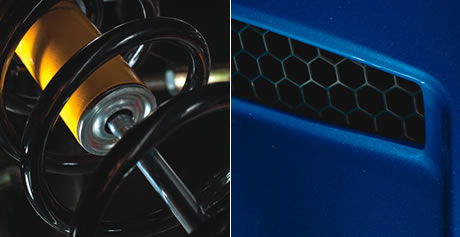 [Photo: Jon M. Fletcher] |
?
 The Money Man: Jim Thomas CFO Jim Thomas has more than 30 years of experience in finance, coming from MapQuest, where he was COO/CFO and managed MapQuest's initial public offering and sale to AOL. He founded Coastal Dominion Capital, which invests in early-stage companies and serves on the board of the Florida Institute of Technology, where he earned a math degree before his MBA from the University of Virginia. Thomas was drawn to Rivian by Scaringe's technology, the car's gas mileage and the potential for job creation in the area. "The atmosphere here is very similar to the startup environment of the internet days, the culture, the can-do attitude. I said this could be something that could be a lot of fun." Thomas will say almost nothing about how much he's has raised or from whom. "I like to keep everything relatively under wraps." [Photo: Rivian] |
Aside from failed ventures like Samsung's and the near collapse of giants like GM and Chrysler, recent years have seen several major trends in the auto business. One is dictated by the big car firms' need to manufacture on an ever larger, ever more efficient scale: Major manufacturers may crank out occasional limited productions of models like the Miata, but to be competitive worldwide the companies increasingly must create a limited number of platforms and build as many vehicles as possible on them.
The Ford Focus, for example, is meant to be the same machine inside and out whether you buy it in Cologne or Chattanooga. Ford already builds nearly 350,000 units on its "core global" platforms; the company's CFO says the company aims to increase that number to 680,000 vehicles per platform within five years, according to a Deloitte report.
The countertrend to the homogenization at the big automakers is a boomlet in startup car companies marketing an array of niche vehicles, including exotic sports models and a raft of vehicles with "green" appeal ["Road Warriors"].
Rivian Automotive's coupe intends to compete in a slice of that niche market, targeting buyers looking for what Scaringe calls an "affordable premium" car that appeals to drivers who want more than appliance-like utility from a car, but also want a vehicle that's "responsible" in terms of gas consumption and efficiency. Scaringe thinks Rivian's niche will be unique but says it falls amid the market demographics eyed by the Mini Cooper and BMW 3 series.
The car is a sporty, mid-engine, 2+2 coupe (the rear seats are somewhat of a formality) that aims to provide the handling characteristics of a Porsche Cayman and deliver more than 60 miles per gallon — more fuel efficiency than a Toyota Prius. The two-door coupe — originally called the Avera until Hyundai sued, complaining that the name was too similar to its Azera — will come in up to eight colors with a choice of manual or automatic transmission. Scaringe says the car will meet five-star safety standards and sell for less than $30,000.
Ambitious goals. He'll achieve them, Scaringe says, through the way his car is engineered and how it will be manufactured.
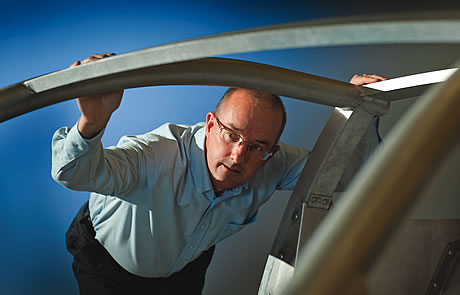 The Logistician: Adrian Elliott Adrian Elliott left a stable, 17-year stint with Ford to work for Scaringe as director of manufacturing. At Ford, Elliott, a materials scientist with degrees in biochemistry and "polymer and fibre science," was part of a group that developed the Ford GT, a mid-engine two-seater sports car that Ford produced in 2005-06. Scaringe's operating plan, he says, was "well thought out and made business sense." For Elliott, it was a chance to "actually influence the direction the company went." He'll be responsible for everything from deciding on materials to where to site the company's factory to developing supplier relationships and designing the assembly process. [Photo: Jon M. Fletcher] |
Essentially all carmakers, from Kia to Cadillac, he says, "build cars exactly the same way" — using giant presses to stamp 300 to 400 sheets of steel into shapes that robots then weld together and paint before assembly-line workers squeeze motor, seats, electrical and other systems into the frame.
The traditional car-building process enables the manufacturer to buy the car's individual components cheaply. The
tradeoff is the need for massive capital investment upfront for the presses, tools (the shapes), welding robots, paint shop, etc. "Just to build the basic structure" of a new model in the traditional way can require up to $500 million in equipment, Scaringe says. The traditional process also makes assembly complex.
Scaringe aims to turn that dynamic upside down by swapping some additional expense on the individual pieces of the car for big savings in capital costs and ease of manufacturing.
Rivian cars, he explains, will not consist of welded-together sheets of steel. Essential structural components will be made of aluminum that's heated and squeezed into the desired shape. Aluminum, for the moment, costs more than steel but produces weight savings — more than 1,000 pounds per vehicle — that Scaringe says will boost the vehicle's fuel economy.
The biggest departure from the traditional approach, however, is that Scaringe has engineered his car to be built in four modules. A central core module houses the passengers and engine; a front module encapsulates the front wheels and suspension; there's a similar module for the rear wheels and suspension; and then a roof module ["Nuts and Bolts"].
The modules, Scaringe says, will be completed independently and then bolted together, with the roof module not attached until after the seats, dashboard and electrical systems are inside the car. His production process is "very different from a typical structure where you build the whole structure first and plug everything in," he says. "We put things in as the structure is being built."
The car's skin — the body panels — will be constructed of a thermo plastic like that used by BMW for some of its models and mechanically attached to the frame after the rest of the car is finished. "We'll be building from the inside out," he says.
The design, he adds, means the car can be easily fitted with custom-designed body panels for sale in overseas markets with different style preferences — without having to re-engineer the basic structure of the car.
Scaringe says almost all of the parts in his car, including the engine, will be built to Rivian's specifications by outside suppliers. His factory — location in Brevard County to be announced — will require no big stamping presses and no paint shop, serving simply as an assembly site for the parts. (Already, he notes, some traditional manufacturers are having up to 50% of their parts made by outside manufacturers.)
Scaringe claims the overall approach cuts his capital costs by 90% and will enable Rivian to build its car in 10 hours, half the 20-hour average build time for a typical production car.
Rivian, Scaringe says, will build two more rounds of prototypes next year for media reviews and testing, and he expects to add significantly to the company's current 30-plus employees in the coming months.
Scaringe says he expects to be actually producing cars for sale by late 2013 or early 2014 and says he can achieve above-average margins. He'll discuss neither those margins nor exactly what his venture will cost, saying only that it will require more than $100 million in investment.
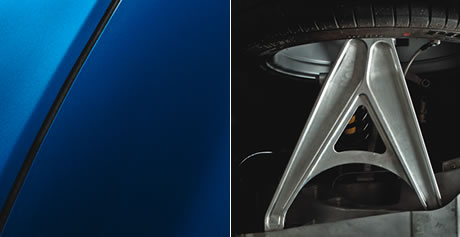 [Photo: Jon M. Fletcher] |
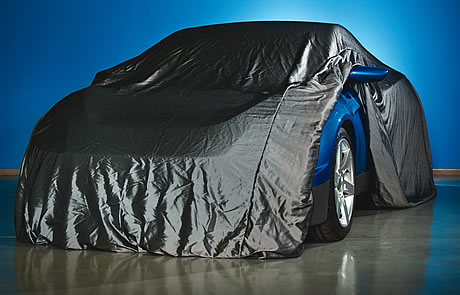 [Photo: Jon M. Fletcher] |
Aside from the crucial task of raising enough money to keep a car venture going, the biggest challenges Scaringe faces, say experts, are integrating all of the car's systems — electrical, safety, etc. — surmounting regulatory hurdles, and then finding dealers willing to sell and service the car.
Scaringe says most dealer agreements with major carmakers require exclusivity, so he doesn't expect to see Toyota-Rivian signs sprouting along the highway, for example. His initial plans are to market the car in Florida then throughout the rest of the country, with a focus on the strongest markets, such as California, Texas and locations on the east coast. He's had expressions of interest, he says, from dealers who carry a cluster of high-end luxury brands as well as from owners of chains of dealerships who could graft a separate Rivian operation adjacent to an existing dealership. Dealers, he says, "are hungry for this kind of product." He declined to provide the names of potential interested parties.
Scaringe will offer dealers an interesting approach to managing inventory — because of the way the car is engineered, dealers might carry only three or four completed coupe "shells" at a time, along with sets of exterior panels in all available colors. When a customer purchases a car, the panels can be attached at the dealership in less than two hours, Scaringe says.
As for service, he says the car is being engineered so that little training will be required of service personnel at dealerships that carry the vehicle. Service and technical information will be open to any mechanic, he says.
On the Space Coast, the prospect of a new assembly plant with about 1,200 workers that could make immediate use of the area's technically oriented workforce is heady stuff for economic developers — particularly now that the region has entered the post-shuttle period.
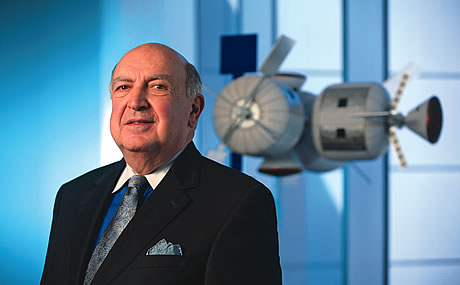 Space Florida President and CEO Frank DiBello: Rivian has an "almost perfect application of defense and space technology applied to a next-generation automotive platform." [Photo: Gregg Matthews] |
"I'm extremely enthusiastic," says Frank DiBello, president and CEO of Space Florida, an independent special district that serves as the economic development agency for the state's aerospace industry. DiBello says Space Florida was intrigued enough by Scaringe's effort that it purchased his first prototype and had NASA engineers test it for structural integrity. A Rivian spokesperson says the results "validated" the company's engineering approach.
Rivian, says DiBello, has an "almost perfect application of defense and space technology applied to a next-generation automotive platform." Scaringe, says DiBello, is "incredibly bright and understands what he's doing. I'm convinced he'll be successful." Even with just a prototype, Scaringe's venture has inspired enough enthusiasm that he won the 2011 Governor's Business Diversification Award for entrepreneurship.
Meanwhile, Scaringe is already thinking beyond the coupe to a four-door sedan and crossover models built on the same platform. He also expects to offer a proprietary, diesel hybrid engine that gets 90-plus mpg as part of a future package.
One expert says Scaringe might have been well-advised to spend a few years working for a carmaker before trying to start one. Scaringe says that career path never occurred to him. He says he grew up watching the operation of his father's firm closely, and along with his formal engineering studies he says he has carefully studied the history of maverick startups like Zappos and Southwest Airlines.
Starting a car firm with a new manufacturing approach was all he ever had in mind. "I've wanted to do this since I was 16," he says.













